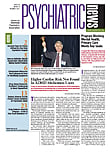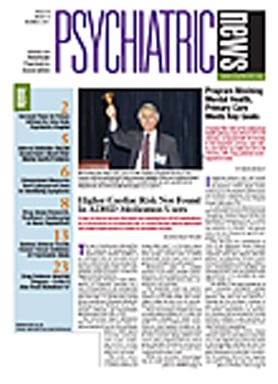Research, innovation, and leadership mixed with a force that surpassed the powerful nor’easter that blew into Boston the same weekend in October as did the 42nd annual meeting of the American Academy of Psychiatry and the Law (AAPL).
The AAPL meeting, which attracts specialists interested in the overlap of mental health and law, commenced with a dynamic opening ceremony led by President Peter Ash, M.D., on Thursday, October 27. Attendees were reminded of the organization’s mission, and at the fore-front of the agenda were education, development, and research.
Several psychiatrists were honored by the academy for their contributions to the field of forensic psychiatry. Ezra Griffith, M.D., was presented with the 2011 Golden AAPL, and Liza Gold, M.D., received the Seymour Pollack Award, recognizing her distinguished contributions to the teaching and educational functions of forensic psychiatry. Ashok Van, M.D., was presented with the Red AAPL Outstanding Service Award, while Kenneth Weiss, M.D., took home the Award for Outstanding Teaching in a Forensic Fellowship Program.
The landscape of the AAPL meeting, like the weather outside, underwent a visible transition with a younger demographic and upswing in female attendance compared with previous years. Up-and-coming forensic specialists in attendance included Rappeport Fellows Sandra Antoniak, M.D., John Jimenez, M.D., Monifa Seawell, M.D., Abilash Gopal, M.D., Kevin Marra, M.D., and Melissa Spanggaard, D.O.
These fellows have big shoes to fill as they follow in the footsteps of recent grad uates and newly appointed academic faculty, who presented innovative research. Poster topics traversed criminal and civil issues. Pornography in prisons, criminal responsibility, and violence-risk assessments were hot topics, as was litigation within the National Football League. Adam Ligas, M.D., presented a novel poster on jailhouse tattoos, which attracted attention as did original research by Susan Gray, M.D., on the right to a speedy trial in New York. My topical research on false confessions complemented a distinguished lecture by Dennis Maher, a criminal exoneree. Maher entranced his audience with a firsthand account of spending 19 years in prison before postconviction DNA testing proved his innocence.
Peter Early, another distinguished lecturer, contributed to the educational component of AAPL by highlighting the criminalization of his mentally ill son. Early, an acclaimed journalist and author of the book Crazy: A Father’s Search Through America’s Mental Health Madness, detailed his obstacles navigating a complex mental health and judicial system.
Parents are not always able to advocate for their children, however, as Phillip Resnick, M.D., reminded crowds during his astounding course on child murder by parents. Continued research in filicide is being undertaken by Susan Chlebowski, M.D., and James Knoll, M.D., who presented a poster on child murder.
Transitions in technology regarding the way we communicate, investigate, and monitor data were apparent at the AAPL meeting. Scientific studies about the implications of social-networking sites, advanced brain-imaging techniques, and electronic monitoring of prescriptions generated many thoughtful discussions among members noshing at coffee breaks and perusing the book store. Mark Hauser, M.D., and colleagues presented a workshop on the use of computers and technology in forensic psychiatry.
Academia bubbled with enthusiasm as like-minded psychiatrists coalesced Friday evening at a reception. Overheard discussions ranged from the financial barriers to forensic fellowship training programs to personal stories of being “in the lion’s den” during cross-examination. The latter topic was undoubtedly stimulated by the rousing workshop presented by Roger Samuel, M.D., Marla Hemphill, M.D., and Mark DeBofsky, J.D.
Other workshops that garnered much attention included those on traumatic brain injury, genocide, immigration, and restraint reform. Colleagues from the United Kingdom staged an educational, albeit lackluster, debate around the utility of Hare’s Psychopathy Checklist. Meanwhile, it was difficult to find a seat in the riveting analysis of Colin Ferguson’s pro se competence, led by Howard Zonana, M.D.
Early career forensic psychiatrists, myself included, reaped many benefits from listening to Thomas Gutheil, M.D.’s career trajectory and advice during his annual early career breakfast forum. Whether venturing into private practice, working in correctional facilities, training fellows, or joining the Beth Israel forensic psychiatry service, everyone gleaned insights from his presentation.
Transitions are abundant in this evolving field that makes AAPL’s future exciting. There were more than two dozen scientific papers and research works in progress presented at the meeting. Suzanne Yang, M.D., and her colleagues are asking questions about how evaluees actually hear expert testimony. Douglas Mossman, M.D., and Drew Barzman, M.D., are assessing the risk of aggression in pediatric populations. Mossman and Yang joined other leaders such as Phillip Candilis, M.D., Susan Hatters-Friedman, M.D., and Robert Trestman, Ph.D., M.D., in a motivational panel about becoming a researcher.
AAPL’s mission of education, development, and research are vital to its ongoing success. The 42nd annual meeting was an immense success, and I for one look forward to seeing everyone next October in Montreal.


